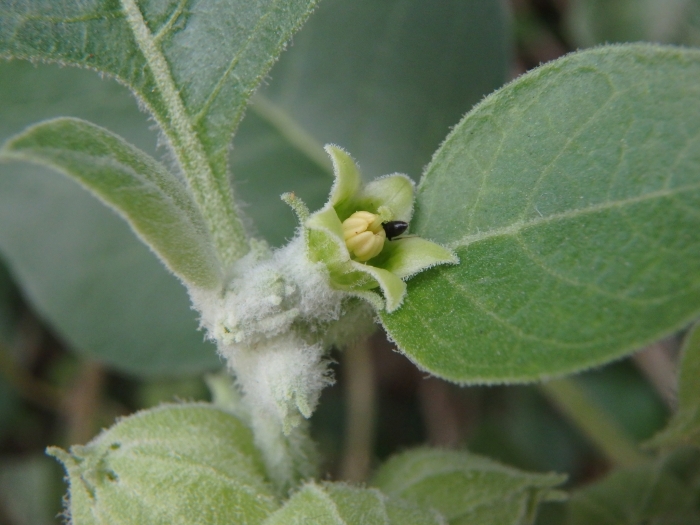Ashwagandha
(Withania somnifera)
Ashwagandha (Withania somnifera)
/
/

Daniel Cahen
CC BY 4.0
Image By:
Daniel Cahen
Recorded By:
Copyright:
CC BY 4.0
Copyright Notice:
Photo by: Daniel Cahen | License Type: CC BY 4.0 | License URL: http://creativecommons.org/licenses/by/4.0/ | Rights Holder: Daniel Cahen | Publisher: iNaturalist | Date Created: 2018-11-29T06:28:52-08:00 |
























Estimated Native Range
Summary
Withania somnifera, commonly known as ashwagandha or winter cherry, is an evergreen shrub native to arid regions of India, the Middle East, southern Europe, and parts of Africa, often found in open scrublands and disturbed areas. It typically grows 14-30 inches tall with tomentose (covered with dense, matted, woolly hairs) branches. The leaves are dull green, elliptic, and the plant produces small, greenish-yellow bell-shaped flowers. After flowering, it bears orange-red fruit enclosed in a papery husk, which is notable when ripe. Ashwagandha is renowned for its medicinal properties and is a key herb in Ayurveda.
The plant is valued for its adaptogenic effects, believed to help the body resist stressors of all kinds. It is cultivated for its roots, which are harvested in the drier regions where it thrives. Ashwagandha prefers dry stony soil, tolerates sun to partial shade, and requires minimal water once established, making it suitable for xeriscaping. It can be propagated from seeds or greenwood cuttings. In addition to its medicinal uses, it is sometimes grown as an ornamental for its interesting fruits. However, gardeners should be aware of potential pests such as leaf spot disease, treehoppers, and red spider mites. Due to its bioactive compounds, including withanolides and alkaloids, it has earned the nickname "Indian ginseng." Caution is advised when using ashwagandha as it may interact with prescription drugs, and its use during pregnancy or breastfeeding is contraindicated.CC BY-SA 4.0
The plant is valued for its adaptogenic effects, believed to help the body resist stressors of all kinds. It is cultivated for its roots, which are harvested in the drier regions where it thrives. Ashwagandha prefers dry stony soil, tolerates sun to partial shade, and requires minimal water once established, making it suitable for xeriscaping. It can be propagated from seeds or greenwood cuttings. In addition to its medicinal uses, it is sometimes grown as an ornamental for its interesting fruits. However, gardeners should be aware of potential pests such as leaf spot disease, treehoppers, and red spider mites. Due to its bioactive compounds, including withanolides and alkaloids, it has earned the nickname "Indian ginseng." Caution is advised when using ashwagandha as it may interact with prescription drugs, and its use during pregnancy or breastfeeding is contraindicated.CC BY-SA 4.0
Plant Description
- Plant Type: Shrub
- Height: 1.5-2.5 feet
- Width: 1.5-2.5 feet
- Growth Rate: Moderate
- Flower Color: Green
- Flowering Season: Fall
- Leaf Retention: Deciduous
Growth Requirements
- Sun: Full Sun
- Water: Low
- Drainage: Medium, Fast
Common Uses
Drought Tolerant, Edible*Disclaimer: Easyscape's listed plant edibility is for informational use. Always verify the safety and proper identification of any plant before consumption.
Natural Habitat
native to arid regions of India, the Middle East, southern Europe, and parts of Africa, often found in open scrublands and disturbed areas
Other Names
Common Names: Ashwagandha, Poison Gooseberry, Winterkirsche, Withania, Rennet, Indian Ginseng
Scientific Names: , Withania somnifera, Alicabon somniferum, Hypnoticum somniferum, Hypnoticum somniferum, Larnax morrisonii, Physalis alpini, Physalis arborescens, Physalis flexuosa, Physalis scariosa
GBIF Accepted Name: